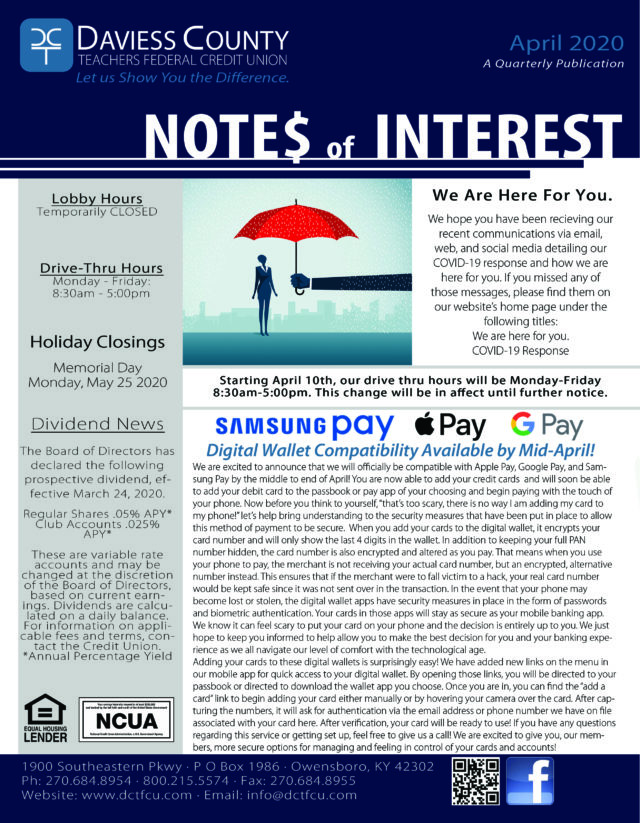ALL Youth ages 0-17 can earn up to $20.00 deposited into their account. That’s $20.00 for free!
This year, we are still giving every child a monetary prize, but will be changing up our methods to support the new social distancing guidelines. Instead of booklets, we are offering a short remote learning experience through our Financial Wellness Center for each age group to complete for the $20.00 deposit! The age groups will be split into 3 groups. 0-5, which is mainly for the parents of children; 6-12, for the young child; and 13-17, lessons for older children. Each age group will be required to read specified articles in our Financial Wellness Center and complete questions and/or activities associated with those articles or courses. Please email the completed questions to [email protected] with the subject “Youth Month” and include both your name and your child’s (or grandchild’s) name in the email as this is the only way we will be able to know who to apply the monetary credit to. (If you are older with your own email address, please include your full name in your email as well). We will also be sending out an email with this information and the questions so feel free to respond to that email with your answers if you find that to be easier. The money will only be deposited into the child’s account so if the child does not have an account, you are welcome to open one at any time and be eligible for the prize! We offer a fully remote online account opening experience so feel free to click “Open an Account” on our website to get the process started!
First, all ages will be using the FINANCIAL WELLNESS CENTER. You are welcome to click this link to access the articles or courses or use the direct links below that will be utilized for completing these questions. Below are details for earning the $20.00 deposit for each age group:
AGES 0-5 (please include your children if you believe they can comprehend):
To begin, please access the “Teaching children about money” article here or in the Wellness Center. Email the answers to the following questions along with your name and your child’s (grandchild’s) name.
- To help a young child understand the concept of budgeting, what is the suggested method to start with?
- When creating a budget, what are the three suggested categories to separate money?
- Name 2 examples given of short-term savings goals. __________ ____________. If your child is old enough, briefly explain short-term saving to them. What would they like to save for?
- A good suggestion to motivate a new saver is to offer an incentive. As an incentive to put money into long-term savings, you might consider making a ____________ _________________.
- Please write out the first sentence of the One Word of Caution paragraph at the bottom of the article.
AGES 6-12:
To begin, please access the “50/30/20” article here or in the Wellness Center. This article may be slightly more complex than your child’s age. Please hit the highlights and read/explain to them the basics surrounding the questions below. Email the answers to the following questions along with your name and your child’s (grandchild’s) name.
- What does 50/30/20 stand for? 50% ________. 30% __________. 20% _________. Feel free to play with the 50/30/20 calculator to help them see!
- Read the needs section and briefly explain to your child. What are 3 examples of needs? _________________. ________________. _______________.
- Read the wants section and briefly explain to your child. What are 3 examples of wants? _______________. _______________. ______________.
- There is no financial habit as important as saving. One of the great secrets of saving is finding ways to make it _______________.
- Saving is not about creating a pile of money, it is about ____________ and ______________ .
AGES 13-17:
For questions 1-3, please access the “Budgeting” article here or in the Wellness Center. For questions 4-6, please access the Coach: Build Your Emergency Fund exercise here or in the Wellness Center. Email the answers to the following questions along with your name (and your child’s name if they do not have an email address.)
“Budgeting”
- Your budget is your _________ for keeping ____ _____ ________ and for sticking to your _______ goals. Feel free to play around with the budget calculator according to your situation.
- What is considered a fixed expense? What is considered a variable expense?
- If you get a bonus, name one recommended way to use it?
“Coach: Build Your Emergency fund”
- What are 2 listed examples of essential expenses? ______________. _______________.
- For the exercise, add 2 expenses, Mortgage/Rent: $800 and Groceries $800. What is the suggested savings goal?
- Your emergency fund should be ______ to ________. It should be ____% ______________ for when you need it.
AGAIN, please email ALL responses to your specific age appropriate questions to [email protected] with the subject “YOUTH MONTH.” Due to changes in staff schedules, we ask for patience in receiving your deposits. We will check the emails and make all deposits on Fridays. If you feel there was an error in receiving your deposit, feel free to email me directly at [email protected].
Don’t forget! We will NOT be offering the $50.00 Savings Deposit Challenge this year since young members are unable to come in and make the deposits themselves and this drawing is largely in place to encourage that practice.
We are excited to see you all join us in celebrating the MAGIC of SAVING this April for National Credit Union Youth Month! We hope it helps you become wiser about saving!
